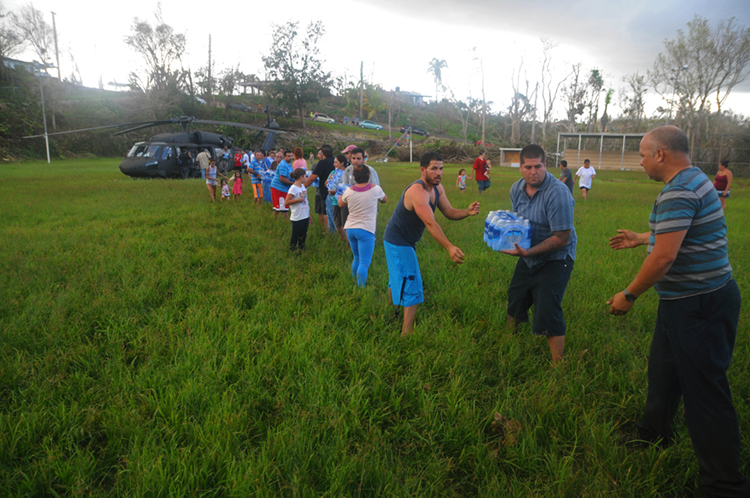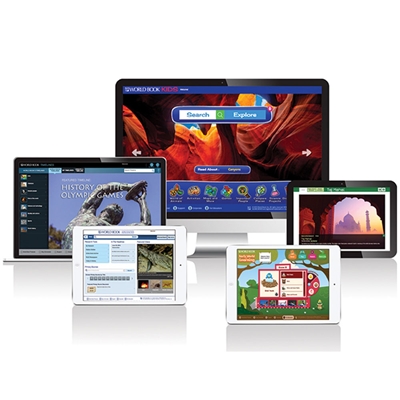On the heels of Harvey, Irma, Jose, and Katia, Hurricane Maria churned through the Caribbean Sea in mid-September 2017. The storm hit the islands of the Lesser Antilles hard, but Maria saved its worst for Puerto Rico, a commonwealth of the United States.
Hurricane Irma skirted Puerto Rico on September 6, causing minor damage and an electric power outage. As Maria approached two weeks later, Puerto Ricans once again took cover—but Maria proved far worse than its sister hurricane. On September 20, Maria struck the island with torrential rains and winds well over 100 miles (160 kilometers) per hour. In a matter of hours, record rainfalls drenched the island, with the east-central city of Caguas topping the gauges at nearly 40 inches (100 centimeters). Storm surges and flash flooding submerged large parts of the island, including neighborhoods of San Juan, the capital. Reservoirs and rivers overflowed and dams threatened to burst. Electric power went out—and stayed out—throughout Puerto Rico. Cellular phone service vanished, banks ceased functioning, roads became impassable, and television and radio stations went silent. “Everything collapsed,” said Héctor Pesquera, Puerto Rico’s commissioner of safety and public protection. “Everything collapsed simultaneously.”
Maria left Puerto Rico as quickly as it came, and as the skies cleared, the devastation was evident. Houses and trees were reduced to splinters; cars were scattered and half-buried in water and mud; farm crops lay shredded; and everywhere were broken windows, chunks of rooftops, and street signs twisted into knots.

Tens of thousands of people were stranded, and recovery efforts began immediately. The Puerto Rico National Guard rescued more than 2,000 people in the first 24 hours, and thousands of others found help in the days to come. But for many people, it was already too late. Drowned bodies began appearing, and as of October 18, the death toll on Puerto Rico stands at 48. Many people remain missing, however, and the number could still rise. Weeks after the storm, many areas still lack electric power and phone service, and there is still not enough food, water, medicine, and fuel to help people who have lost everything.
Lagging relief efforts from the mainland United States were heavily criticized, and there was a noted lack of urgency in the reaction of President Donald Trump, who downplayed the seriousness of the disaster. U.S. government aid for its Puerto Rican citizens did eventually kick into high gear, but only after several days of wrangling and indecisiveness on the part of administration officials.
Individual charities and international organizations have brought in millions of dollars worth of aid to Puerto Rico, as have such Puerto Rican celebrities as Marc Anthony, Jennifer Lopez, Ricky Martin, Lin-Manuel Miranda, and Daddy Yankee. Former baseball star Alex Rodriguez, rapper Pitbull, and Spanish singer Enrique Iglesias have also helped significantly.
Untitled Document
Can't view the linked articles? Subscribe to World Book Online

World Book Online delivers a progressive sequence of core databases supported by supplemental
tools, such as language translation, graphic organizers, and unique Webquests. Moving from
Early World of Learning to World Book Advanced, World Book Online aligns end-users with their
appropriate learning levels. Each stand-alone site provides additional features to support the
needs of users’ specific capabilities.
The World Book Difference
World Book combines cutting-edge technology with traditional editorial excellence to produce
authoritative, trustworthy, and unbiased content. The digital content is updated in real time and
carefully curated for each learning level. Accessible 24/7, the content is available on a variety of devices.
World Book Online combines 21st-century instructional techniques with timely information.
By breaking down complex topics and using easily understandable text, World Book Online helps to
build fluency and increase comprehension. Featuring single sign-on capability, these sites are paired
with highly visual content to engage even the most reluctant reader. Our collection of resources kindles
a lifelong learning experience for every user. This adherence to clarity, currency, and accuracy makes
World Book’s digital offerings an information hub for the classroom, library, and beyond.
Image 1: A Puerto Rican coastal community lies in pieces on Oct. 2, 2017, nearly two weeks after Hurricane Maria devastated the island. Credit: Mani Albrecht, U.S. Customs and Border Protection
Image 2: Puerto Rican civilians pass cases of fresh water delivered by a Puerto Rico National Guard helicopter on Oct. 4, 2017. Credit: Spc. Agustin Montanez, The National Guard (licensed under CC BY 2.0)